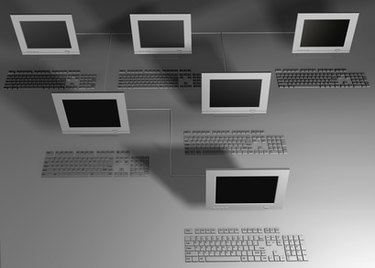
In "Fundamentals of Information Systems," Ralph Stair and George Reynolds define a computer-based information system (CBIS) as a "single set of hardware, software, databases, telecommunications, people, and procedures configured to collect, manipulate, store, and process data into information." Some experts list five basic elements of a CBIS: hardware, software, data, procedures and people. Others add a sixth element, communications, to the list.
Hardware
Video of the Day
Hardware is the most obvious part of a computer-based information system. Hardware refers to the computers themselves, along with any and all peripherals, including servers, routers, monitors, printers and storage devices. A CBIS may use a single computer or thousands.
Video of the Day
Software
Without software, the hardware wouldn't be very useful. Software, the second element of a CBIS, is what tells the hardware how to function. It gathers, organizes and manipulates data and carries out instructions. Everything you do using a computer is done by the software.
Data
Data, or information, is the third element of a CBIS. Just as hardware cannot function without software, software cannot function without data. This is the information part of an information system, and whether that is statistical data, sets of instructions, lists of names or even graphics and animations, it is all key to a CBIS.
Procedures
It is commonly said that "procedures are to people what software is to hardware." The fourth element of CBIS, procedures are the rules, descriptions and instructions for how things are done. In computer-based information systems, procedures are frequently covered in instruction or user manuals that describe how to use the hardware, software and data.
People
People are the most often overlooked and most important part of a computer-based information system. It is people who design and operate the software, input the data, build the hardware and keep it running, write the procedures and it is ultimately people who determine the success or failure of a CBIS.
Communication
Communication is left out of some lists of CBIS elements, but for a CBIS that involves more than one piece of hardware to function, communication or connectivity is a necessity. This is, in part, because parts of it are covered under hardware. The components that allow one computer to communicate with another are hardware and are controlled by software. If communication between people is included in this element, though, it is an important element.